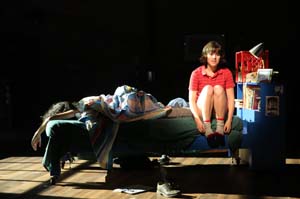
Paulanne Simmons
|
"Fun Home" In recent years there have been many gay coming-of-age plays, but "Fun Home," adapted by playwright and lyricist Lisa Kron and composer Jeanine Tesori from Alison Bechel’s graphic memoir is different. First, it’s a musical. Second, it’s about a lesbian. And finally, Alison’s story is told in counterpoint to that of her father, a gay man with a not-so-secret life. Directed flawlessly by Sam Gold, the show is told as a memory play (much like The Glass Menagerie, currently in a fine Broadway revival), with three actresses playing the role of Alison: Sydney Lucas as the school age child, Alexandra Socha as an Oberlin College student and Beth Malone as an adult. Alison’s father, Bruce, is played by the incomparable Michael Cerveris. And Judy Kuhn is excellent as his long-suffering wife, Helen, a role that deserves much more attention than Kron has given it. There are many elements to this story. All of them are interesting and entertaining, although some are not particularly necessary to the main themes. Bruce is a teacher, a funeral director and a restorer of homes. While the theme of restoring homes to their original glory, which includes polishing the surface, is a fine metaphor for what is going on in the Bechel home. it’s not clear why Kron and Tesori gave one of their best numbers, “Come to the Fun Home,” to a fake commercial the kids are making for their father’s business, especially since this aspect of the story is pretty much dropped afterwards. The best scenes and songs are those relating to Alison’s growing awareness of her sexuality (Socha’s hilarious “Changing My Major”) and Bruce’s complicated sex life (Kuhn’s “Days,” Cerveris’s “Edges of the World,” both poignant and terrifying). That Fun Home can be heartbreaking is obvious. That it is also at times quite funny is surprising and delightful. "Fun Home" is so right in so many ways it’s easy
to forget it’s shortcomings. But they are there, mostly in
the unexplored territory. Why did Helen have three children with
a man she knew very early on was having sex with underage boys?
How did Bruce Kuhn does a good job portraying a woman seething with rage, but the book does not give her the tools to explain her decisions. And Cerveris is helped in making Bruce sympathetic by our politically correct understanding of the dilemma of gay men before Stonewall. But he’s still a faithless husband who knowingly puts his whole family and himself in great danger. An element of the story that is only touched on. Most of the people seeing the show at the Public, as well as the
reviewers, will note only the energetic originality of the show,
the fine acting, the elegant (if slim) score. But uptown audiences
have different expectations and may not be so interested in dysfunctional
families. Shows like "Next to Normal" are better at getting
awards than they are at getting audiences. Hopefully the Public
will think twice before bringing Fun House to Broadway and risking
a disaster similar to the one that befell them with "Bloody
Bloody Andrew Jackson." |
| museums | NYTW mail | recordings | coupons | publications | classified |

